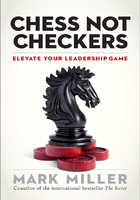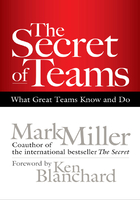There are two ways to lead an organization: by power or by force. The first way creates the shortest distance between leaders and their goals-but it is much harder. For this reason, many leaders default to the use of force.
Power is the ability to intrinsically motivate people to act in the way you want them to. You tap into their hearts and minds, and they follow you because they want to. Having true power means that the team becomes an extension of the will of the leader. This is the ultimate goal for any leader, and this is what Julius Caesar was able to achieve.
Conversely, force is the use of external threats or pressure to compel action. Leadership by force is of questionable effectiveness and certainly cannot be sustained over a period of time. If someone falls in line with a course of action because they fear for their job, then they aren't really being led; they are being pushed. This is actually despotism, and it is just as prevalent in the modern organization as it was in the ancient world. It isn't true leadership, but it's a lot easier.
Through human history, force has been the default leadership style. As we try to break free from the historical pull of force, let us consider one of the greatest examples of a leader who understood the critical distinction between power and force. For his ability to connect with people in a genuine way, for his mastery in unlocking the intrinsic motivation of those in his organization, and for his demonstration of the triumph of power over force, there is no better leadership role model than Julius Caesar. Very few people so innovative, so ahead of their time, could break the mold and so decisively follow such an unknown path.
It was 47 BC. Julius Caesar stood before his army, the most powerful that Rome had ever assembled. For fifteen years they had marched through Europe, fighting Germans, Gauls, and even other renegade Roman armies. They had crossed the English Channel to become the first Romans to encounter the mystical and terrifying island to the north. They had followed their commander to the ends of the earth, defeated every enemy, and stared down death. Now they were back on the Italian peninsula and in open revolt.
The time had come to call due all of Caesar's promises: back pay, land to farm, an end to endless campaigning, and no more fighting other Romans. These were the incentives he had used to keep his army motivated. But conquest after conquest came and went, and they were always just one more victory away. Enough was enough.
At first the army simply refused to march on. Then inaction turned to discontent, and resentment boiled over into fury. The deadliest army in the world cut itself loose from its moorings, angry and leaderless, and whipped itself into a frenzy. Thousands of soldiers from the most elite fighting unit in world history rose up. Instead of fighting foreign enemies, the army ravaged its own. They began turning against the citizens they were sworn to protect and against their commander.
It didn't happen all at once; the mood of the army had grown sour steadily over some time. During most of this insurgency, Caesar wasn't with his men, however. He was in Egypt floating down the Nile on a pleasure cruise with the charming queen of Egypt, Cleopatra. While taking his ill-timed vacation, Caesar had turned over command of the army camped in Italy to his lieutenant, Marc Antony, who lacked Caesar's charisma and leadership skill. It did not take Marc Antony long to lose control, and with Caesar in Egypt, Antony failed to stem the tide of sinking morale.
Once Caesar learned of the critical situation back home, he wasted no time returning to Italy to confront his troops. Without pausing to gather bodyguards or take any precautions for his personal safety, he marched straight to the front of his troops and quietly and confidently took the podium. If he was anxious as he faced his army, he didn't show it. Standing before thousands of trained killers who in the last days and weeks had savaged the surrounding area, he remained calm and stone-silent. He stood at the head of his army until all of his troops fell into quiet respect for their commanding officer. Before he had even spoken a word, he had leveled the playing field.
Caesar uttered one simple word. Then he fell silent, letting his single utterance permeate the air. At first the soldiers were confused. Was he only going to say just one word to address their grievances? And then the weight of the word sank in.
"Citizens."
Caesar didn't use force, bringing in other troops to suppress the revolt. He didn't threaten violence or use intimidation to take back control. No, Caesar used his power to intrinsically motivate his army. He tapped into the collective psyche of his army and found a way to remind them that they wanted to stay in his good graces. He didn't tell them to stop their revolt; he gave them the necessary information to allow them to choose for themselves, a much more sustainable and authentic decision.
With that one word, the revolt was over. But what was so magical about it? How could any leader have so much authority, so much gravitas, that he could break the murderous resolve of a treasonous army with such little effort?
We will explore the extent of Caesar's leadership power in a moment, but this little footnote from more than two thousand years ago points to something often missed in looking back at history. We neglect-to our detriment-the leadership lessons that history affords us. Caesar was a transformative figure in history. He was, and still is, truly largely than life. But lost in the fantastic stories of the extraordinary man is the very real, very relevant set of lessons that he offers leaders today. With Caesar, we find many layers of relevance and insight. His subtle and brilliant leadership mastery still matters now, to anyone seeking to lead an organization, a team, or a change management agenda.
In many ways, Caesar foreshadowed the archetype of the modern, enlightened, and progressive leader. Yes, he was absolutely a product of his times, and those times reflected different values and ways of doing things. Not everything Caesar said and did should be taken as a literal example of how to lead in the modern world. But he was so far ahead of his own time, so different, so brilliant, that he closes the leadership gap between then and now more than anyone else who has ever lived.
Year in and year out, millions of people pore over the latest business best-seller lists for the next leadership book to read or wait for the next edition of Harvard Business Review for the latest dispatches by some management luminary. Often the concepts these authors present are very insightful, but just as often, they are drawn from an individual's personal experiences and lack analysis and objectivity.
Through temporary trends and fleeting concepts, the search continues for the sound principles and durable techniques of leadership. But trends and concepts come and go. History endures.
The lessons of history should not be the exclusive domain of historians. Modern leaders seeking to up their game should look to whatever sources of insight they can find, even when those sources might be a little unorthodox. The history of civilization, after all, is the history of leadership. It might seem strange to imagine Julius Caesar strutting into a boardroom or developing a human capital strategy, but his actions and abilities can and should inform us in such endeavors today.
The very name of Caesar has come to be cloaked in myth and folklore. Everyone knows his name, but what do we really know about him as a man, as a leader, as someone who actually lived and breathed, and walked the same earth as we all do?
Caesar was a transformative leader. He lived in a violent and tumultuous time, rising through Roman society because he possessed unique and innate abilities as a leader. What separated Caesar from the pack was that he understood the important distinction between power and force. While history is full of examples of those who ruled with an iron fist, Caesar went in a different direction, unlocking the hidden motivation of those he sought to lead so that they chose to follow. In doing so, he set the blueprint for leadership that we seek in great leaders today. By going back in time to study Caesar in his own time, we are going back to the birth of modern leadership. In some ways, you could say that Julius Caesar invented modern leadership.
Caesar's career bubbled over with adventure, intrigue, drama, tension, and seduction. There had never been anyone like him before, nor has there been anyone like him since. But he was a man, a flesh-and-blood human being, and he had quirks and faults to go with all of his genius and gravitas.
He was ambitious, vain, and quite possibly manic. His energy level was extraordinary, and more than two thousand years after his death, we can still feel its reverberations. It has been said that Caesar could simultaneously dictate letters to numerous scribes at once. The image of Caesar, in his command tent at the front of a life-and-death battle, dictating four letters to four scribes at the same time and having each one turn out beautifully, held up as an example of the height of Latin prose, is a telling visual of the kind of person he was. His mind was meticulously organized, and he would most likely be described as having a photographic memory today.
But unlike many people with long memories, Caesar was not prone to holding a grudge. On the contrary, in an age when people got all crazy about their honor and prestige, Caesar could easily forget a slight. In fact, he often used this ability to "let it go" to his advantage, showing himself to be a gracious and clement leader, and winning power and loyalty in the process. While his contemporaries often used office or authority to murder adversaries, Caesar won them over with charm, forgiveness, and magnanimity.
Caesar was one of those people who were good at everything they tried. Through his early career, he worked at and refined his skills, but he was building off of a foundation of talent that was staggering. He was as good in one-on-one situations as he was delivering a speech in front of huge crowds. His command of language was exceptional, and he was equally gifted in speaking as in writing. Pliny the Elder, a Roman naturalist and historian, framed his description of Caesar by saying, "I will not speak here of his energy and steadfastness, or of his sublime ability to comprehend everything under the sun, but of the vitality he possessed and the fiery quickness of his mind."
In his book Caesar: A Biography, historian Christian Meier lauds Caesar's quick wit and his ability to pick up new ideas and concepts with remarkable speed. Caesar was adaptable, able to move in and out of various circumstances and social situations with tremendous ease. And despite the steadfastness of Caesar's conviction, Meier says, "there was a playfulness about him, an almost youthful profusion of potentialities." He used humor in a calculated way, defusing tense situations with laughter before things got too far.
Underneath his good-natured veneer, Caesar was deadly serious about getting what he wanted, but he was never insensitive to the goals and needs of the people around him. In fact, he had a unique ability to reconcile his goals with those of his contemporaries and to forge mutually beneficial plans or proposals. Besides, he knew that humorless people wear on those around them and that being too serious would eventually diminish the interest of others to work with him. His colleague and committed opponent Cato never learned that lesson, and most modern books refer to him with words like "stodgy" and "humorless." Caesar saw no advantage in being a wet blanket, so he tended to keep things light as a first line of defense.
For Caesar, anything was possible; it was simply a matter of will and determination. In modern terms, we would say that Caesar had grit, that essential resolve to see something through once his mind was set upon an action or an outcome.
Historians often write about the audacity of his actions. For example, he had affairs with countless married women, including the wives of critical political allies. Certainly this was less shocking in ancient Rome than it would be today, but nevertheless, it's eye-opening that he did so with such amazing frequency.
Caesar was certainly vain. Fastidious in his appearance, he looked for ways to push boundaries in dress and appearance. As a young man, he scandalized older conservatives by-gasp!-wearing his belt loosely. As he got older, his hair-line retreated up his scalp, and it seemed to bother him immensely. Some have credited him with the invention of the comb-over.
In a modern sense, it's easy to imagine getting a drink with him and discussing anything from politics to fashion, sports to science. He was a polymath, interested in everything, and yet deeply accessible to anyone and everyone around him. His contemporaries found him irresistible. There were times in his career when his opponents didn't want to be around him, lest they find themselves unable to resist his charms and come to some sort of an accommodation. If Caesar were plucked from the ancient world and dropped into our own, he would assuredly survive and thrive. One can only imagine that it wouldn't take long for Caesar to rise through the ranks and become a CEO.
Caesar was born into complicated times, with Rome transitioning from one system of government to another. In fact, in many ways, he was the fulcrum of the lever on which that shift happened. His career and life will never cease to be fascinating, and for our benefit, they will always have lessons to teach. For example, in that one word-citizens-the layers of learning are deep and multifaceted. Why was it so darned effective? Let's dive back in.
Back to Caesar's deafening single word. It was disarmingly simple. It took a moment for the gravity of this word to sink in, and its impact cannot be understood without some brief context.
Caesar was a member of the Julii family, one of Rome's most ancient and revered lineages, which traced its ancestry all the way to the goddess Venus herself. To be a Julii was thought to have been literally descended from the gods. As head-scratching as that may seem to us today, Caesar's troops believed it, and whether Caesar believed it or not, he sure went out of his way to remind people of his divine origins.
But despite his godly lineage, Caesar had long projected an image to his troops as a common man. He marched beside them. He ate with them in the mess hall and shared many of their hardships. The contrast between how he acted and how he would have been expected to act was not lost on his troops; they loved him for it. To signify the close bond, Caesar called his men comrades-a much more powerful term than citizens. Outside of the army camps, class and family lineage mattered, but when they were responsible for each other's lives, Caesar-unique among the leaders of his time-and his soldiers were equals. His choice of the word comrade was deliberate. It engendered loyalty.
When confronted with the rebellion of the army, Caesar's use of the word citizens told his men that they were no longer his army. Caesar was saying, "You're not my soldiers anymore. You don't belong in my army. I don't need you. You are average Roman citizens." When the troops came to realize what he had said, they were devastated. Gone was the bond forged over fifteen years of fighting together. Gone was their shared destiny. And-perhaps most important-gone was their equality. With one word, Caesar had asserted his social, political, and moral authority. He had evoked the Roman class system and reminded them of the contrast between himself and them.
For the men of Caesar's army, the weight of this authority coming down on them at once was crushing. It broke their resolve. The army began to cry out, begging for forgiveness. They couldn't bear the thought of losing their special status as comrades with Caesar, descendant of the exalted goddess Venus.
When his men cried out, Caesar ratcheted up the pressure. They could have all their banal demands. He would get a new army-one that he would anoint with his lineage. He would finish the civil wars and bring peace to Rome, and that army was the one that would be steeped in glory, honor, wealth, and prestige.
The revolt crumbled into dust; it was dead, done in by the power of one word. The army begged to be forgiven and returned to their privileged status. They begged to be punished. They begged to get back to work.
At first, Caesar pretended to be indifferent to their cries. Eventually, he "allowed" himself to be persuaded. One more campaign together, he vowed, and then they would have all that had been promised and more: land, money, and glory-and, most important, they could retire as his veterans, his favorites, his comrades. And so promised, so done. Shortly after, they sailed for North Africa and crushed the last significant opposition in the civil war. Caesar was now the undisputed and sole ruler of Rome.
LEAD WITH AN UNDERSTANDING OF HUMAN NATURE
The nature of power is often misunderstood. The secret to Caesar's genius as a leader lay in his unique insight into what power really is, and what it is not.
With one word, Caesar disarmed an armed insurrection and proved his brilliance as a leader. Not through force of arms but through power, he unlocked the motivation within his army to choose on their own to continue to follow him. Any other leader of the time would have raised fresh troops and come storming in, guns (or spears, rather) blazing. Caesar's only armor was his understanding of human nature. It was all he needed.
In antiquity, the use of force was the simplest way to get people to act. Staring down the razor-sharp tip of a sword has a way of narrowing your field of vision, making anything else within your line of sight insignificant by comparison. It is also pretty effective at influencing a decision. A sword says, "Do what I say or bleed." It sends a very compelling message.
While most of us won't literally stare down the wrong end of a sword in our careers, there are certainly modern equivalents of force, such as the fear of not getting a much-deserved promotion or, worse, losing one's job. In this sense, the threat of force is still a looming presence in the modern business world and is still deployed by leaders as they seek to pursue their agendas.
It is power that is at the heart of great leadership, not force. Actions compelled through force may yield the desired result in the short term and may even be required in rare circumstances. But usually, the use of force creates resentment and sows the seeds of discord. Many high-profile leaders have met their demise, both literally and figuratively, because the collective resentment from the use of force built up into full-fledged revolt. Dictators have been toppled, CEOs have been sacked, and incumbents have been ousted because they failed to master this subtle but important distinction.
It's important to note that few leaders in history relied exclusively on power over force. Mahatma Gandhi and Mother Teresa stand out in large measure because they are the exceptions. We shouldn't think of the leadership technique of power as the complete absence of the use of force. Rather, the takeaway should be that the most effective, long-term way to lead people is through the cultivation of power.
With Caesar, we find many layers of relevance and insight into how to lead an organization, a team, or a change management agenda. The truth of who Julius Caesar really was and how he led is even better than the mythology or the poetry of Shakespeare. The events of his life are extraordinary indeed, and he compiled a career more colorful and accomplished than any other leader to date. And he did so by using power over force. Throughout this book, we will cut through the fog and folklore to get to know this man as the extraordinary leader he was, and to let him be our guide in understanding the true nature of power over force.














